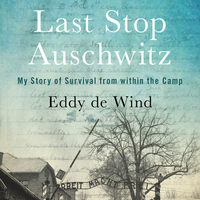Take a photo of a barcode or cover
The star rating is not to say that I somehow enjoyed reading about the horrible things that happened during the 2nd world war in Auschwitz. I just feel like this is really important to read as it is written by a holocaust survivor during the holocaust so it definetly doesn't have biases from non jewish people thrown into the story. This has alot of historical value and people really should read this.
dark
emotional
reflective
sad
medium-paced
dark
sad
tense
medium-paced
Eindstation Auschwitz - Eddy de Wind. (Meulenhoff)
In 1942 meldde de Joodse arts Eddy de Wind zich vrijwillig aan als arts om in Westerbork te werken, in de veronderstelling dat hierdoor zijn moeder uit het kamp zou worden vrijgelaten. Bij aankomst bleek zijn moeder echter al op transport gezet naar Auschwitz. In Westerbork ontmoette De Wind de achttienjarige verpleegster Friedel. Ze werden verliefd en trouwden in het kamp. Samen werden ze in september 1943 naar Auschwitz gedeporteerd. Eddy belandde in barak 9, waar hij werd tewerkgesteld als Pfleger van Poolse gevangenen. Friedel in barak 10, waar de medische experimenten werden uitgevoerd. Pas na de oorlog, die ze beiden op miraculeuze wijze overleefden zonder dat van elkaar te weten, vonden ze elkaar terug in Nederland.
In Eindstation Auschwitz doet Eddy de Wind verslag van de verschrikkingen in het kamp en analyseert en observeert hij het gedrag – zowel goed als kwaad – waar mensen toe in staat zijn. Hij beschrijft Auschwitz zoals nooit eerder is gezien, rechtstreeks vanuit het kamp en met de emotie van dat moment.
Geïllustreerd met beeldmateriaal uit het archief van de familie De Wind, waaronder twee niet eerder gepubliceerde foto's van vlak na de bevrijding van Auschwitz.
Het originele schrift is momenteel een van de belangrijkste stukken van de Auschwitz-tentoonstelling, te zien in New York.
27 januari word de bevrijding van concentratiekamp Auschwitz, nu 75 jaar geleden, herdacht. Vandaag verschijnt odit waargebeurde boek ‘Eindstation Auschwitz’ bij uitgeverij Meulenhoff.
‘Hoe ver is het naar die wazig blauwe bergen? Hoe wijd is de vlakte, die zich uitstrekt in het stralend voorjaarszonnelicht?’
Prachtig en aangrijpend schrijven over liefde, familie en leven.
Een belangrijk en uniek historisch document dat op aangrijpende wijze het lot van gevangenen in de vernietigingskampen in beeld brengt.
Een absolute must-read, al was het maar om aan Eddy’s wens te voldoen dat iedereen weet en gelooft wat er gebeurd is.
‘Het is een dagmars, voor vrije voeten. Één uur te paard, in snelle draf. Voor ons is het verder, veel verder, het is oneindig ver.’
Het boek spreekt voor zich, heftig. Ik geef hierbij een link naar een artikel dat onlangs verscheen naar aanleiding van het boek dat vanaf vandaag weer verschenen is.
https://www.nrc.nl/nieuws/2020/01/09/mijn-vader-vond-zichzelf-geen-held-maar-hij-was-het-wel-a3986277
‘De ss-officier zei tegen hem: ‘Jij Jood, gaat naar Auschwitz, daar zul je blog eenmaal op je knieën smeken om de dood, zó zul je het er hebben.’
Ik hoef niet te zeggen hoeveel waarde dit boek heeft, hoe heftig en emotioneel dit boek is. Laten de ervoor zorgen dat dit boek doet waarvoor het geschreven is. Iedereen laten weten wat er gebeurd is, echt gebeurd is en ervoor zorgen dat dit nooit meer vergeten wordt en nooit meer gebeurd.
In 1942 meldde de Joodse arts Eddy de Wind zich vrijwillig aan als arts om in Westerbork te werken, in de veronderstelling dat hierdoor zijn moeder uit het kamp zou worden vrijgelaten. Bij aankomst bleek zijn moeder echter al op transport gezet naar Auschwitz. In Westerbork ontmoette De Wind de achttienjarige verpleegster Friedel. Ze werden verliefd en trouwden in het kamp. Samen werden ze in september 1943 naar Auschwitz gedeporteerd. Eddy belandde in barak 9, waar hij werd tewerkgesteld als Pfleger van Poolse gevangenen. Friedel in barak 10, waar de medische experimenten werden uitgevoerd. Pas na de oorlog, die ze beiden op miraculeuze wijze overleefden zonder dat van elkaar te weten, vonden ze elkaar terug in Nederland.
In Eindstation Auschwitz doet Eddy de Wind verslag van de verschrikkingen in het kamp en analyseert en observeert hij het gedrag – zowel goed als kwaad – waar mensen toe in staat zijn. Hij beschrijft Auschwitz zoals nooit eerder is gezien, rechtstreeks vanuit het kamp en met de emotie van dat moment.
Geïllustreerd met beeldmateriaal uit het archief van de familie De Wind, waaronder twee niet eerder gepubliceerde foto's van vlak na de bevrijding van Auschwitz.
Het originele schrift is momenteel een van de belangrijkste stukken van de Auschwitz-tentoonstelling, te zien in New York.
27 januari word de bevrijding van concentratiekamp Auschwitz, nu 75 jaar geleden, herdacht. Vandaag verschijnt odit waargebeurde boek ‘Eindstation Auschwitz’ bij uitgeverij Meulenhoff.
‘Hoe ver is het naar die wazig blauwe bergen? Hoe wijd is de vlakte, die zich uitstrekt in het stralend voorjaarszonnelicht?’
Prachtig en aangrijpend schrijven over liefde, familie en leven.
Een belangrijk en uniek historisch document dat op aangrijpende wijze het lot van gevangenen in de vernietigingskampen in beeld brengt.
Een absolute must-read, al was het maar om aan Eddy’s wens te voldoen dat iedereen weet en gelooft wat er gebeurd is.
‘Het is een dagmars, voor vrije voeten. Één uur te paard, in snelle draf. Voor ons is het verder, veel verder, het is oneindig ver.’
Het boek spreekt voor zich, heftig. Ik geef hierbij een link naar een artikel dat onlangs verscheen naar aanleiding van het boek dat vanaf vandaag weer verschenen is.
https://www.nrc.nl/nieuws/2020/01/09/mijn-vader-vond-zichzelf-geen-held-maar-hij-was-het-wel-a3986277
‘De ss-officier zei tegen hem: ‘Jij Jood, gaat naar Auschwitz, daar zul je blog eenmaal op je knieën smeken om de dood, zó zul je het er hebben.’
Ik hoef niet te zeggen hoeveel waarde dit boek heeft, hoe heftig en emotioneel dit boek is. Laten de ervoor zorgen dat dit boek doet waarvoor het geschreven is. Iedereen laten weten wat er gebeurd is, echt gebeurd is en ervoor zorgen dat dit nooit meer vergeten wordt en nooit meer gebeurd.
This was definitely something I usually don't read.
It's a description of Eddy de Winds life at Auschwitz and how he survived it.
It describes the camp and what it was like to be there and what you had to do to survive.
It's different to read someone's story than read about it from school books. This is eye-opening story and worst part for me was the after camp was gone. How people told their stories, what they had seen and done in order to survive, it is awful.
Also, I appreciate de Winds reason for republishing this book: He was worried of intolerance and political violence waking again in western countries (this was 1980). He wanted to stay alive to tell everyone what really happened, to make sure people knew it was true.
Very good book in historical and in educational aspects.
It's a description of Eddy de Winds life at Auschwitz and how he survived it.
It describes the camp and what it was like to be there and what you had to do to survive.
It's different to read someone's story than read about it from school books. This is eye-opening story and worst part for me was the after camp was gone. How people told their stories, what they had seen and done in order to survive, it is awful.
Also, I appreciate de Winds reason for republishing this book: He was worried of intolerance and political violence waking again in western countries (this was 1980). He wanted to stay alive to tell everyone what really happened, to make sure people knew it was true.
Very good book in historical and in educational aspects.
There have been many books written of late about world war II experiences; there are those detailing the lead up to the brutal war, those that discuss the war itself and those that talk about the aftermath but never have I read one which was actually written with a pencil and paper whilst both Eddy de Wind and his wife, Friedel, were imprisoned and put to work at Auschwitz. During His 16 month stay, he recorded the occurrences and his feelings about such incidents and I felt incredibly moved to be reading his personal account. The fact that he had to create a character, Hans, in order to express his thoughts illustrates just how affected and tormented he felt. This is a deeply moving and disturbing account of Nazi atrocities and one mans struggle to survive.
The torturous conditions described made it difficult to read at times but I feel it is a very important book. My heart broke for the separation Eddy and his wife had to endure and I was touched by the small snippets of time they stole together whenever possible. Although this is a terrifying depiction of the great loss of life and what it was like to live under the Nazi regime it does have a powerful and ultimately uplifting message about how with courage and strength you can survive anything. As de Wind recognises the horrors that took place at the camp not only showed the most evil of humanity but the most compassionate and selfless too. Highly recommended. Many thanks to Doubleday for an ARC.
The torturous conditions described made it difficult to read at times but I feel it is a very important book. My heart broke for the separation Eddy and his wife had to endure and I was touched by the small snippets of time they stole together whenever possible. Although this is a terrifying depiction of the great loss of life and what it was like to live under the Nazi regime it does have a powerful and ultimately uplifting message about how with courage and strength you can survive anything. As de Wind recognises the horrors that took place at the camp not only showed the most evil of humanity but the most compassionate and selfless too. Highly recommended. Many thanks to Doubleday for an ARC.




